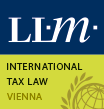The University Act provides for a total of 90 ECTS for the LL.M. program. The program is divided into eight blocks of lectures and comprises the following subjects:
Master thesis
-
Master thesis 2023/2024 full-time program - general topic: GloBE: Pillar 2 – Concepts and Practical Implications
The OECD proposed the introduction of a Global Minimum Tax. Profits will be taxed at a minimum rate of 15% around the world. The EU plans to enact a directive implementing these proposals. The GLOBE rules consist of an Income Inclusion Rule and an Undertaxed Payments Rule. Corporate profits subject to a rate below 15% will be subject to a top up tax. The goal of these rules is to reduce harmful tax competition. The lecture will deal with the scope of the IIR and UTPR, the technical details of those rules, the mechanisms to avoid double taxation, the dispute resolution rules and the practical implications for multinational enterprises. We will also analyze whether the measures achieve their goal or whether multinational enterprises can still reduce their tax liability by shift profits to low-tax jurisdictions.
-
Master thesis 2023/2024 full-time program - workshops
These workshops are directly linked to the introductory class on the general topic and will be held while students are working on their Master’s theses. The participants are introduced to the techniques employed in writing an academic piece of work. Support will also be given on methods of research, using international literature, and its systematic review. Students have the opportunity to show the results of their work in the form of presentations, and to initiate discussion and debate on the topics concerned. The problems which are presented in the final thesis will be discussed in class and possible solutions sought.
-
Master thesis 2023/2025 part-time program - general topic: Anti-Abuse Provisions in International Tax Law and their Interactions
The course provides an overview of the international anti-tax abuse provision at both the OECD and EU level and examines how these rules are interlocked. Particular attention will be paid to the general anti-avoidance rule introduced in the EU with the Anti-Tax Avoidance Directive, and the Principal Purposes Test introduced in the OECD with the Multilateral Instrument. Case law and examples from around the world will provide the foundation for assessing the current general anti-avoidance rules introduced throughout both the OECD and the EU. The background and history of the rules will be analyzed in order to apply them to current structures and practical examples in light of their significant judicial and constitutional backgrounds.
-
Master thesis 2023/2025 part-time program - workshops
These workshops are directly linked to the introductory class on the general topic and will be held while students are working on their Master’s theses. The participants are introduced to the techniques employed in writing an academic piece of work. Support will also be given on methods of research, using international literature, and its systematic review. Students have the opportunity to show the results of their work in the form of presentations, and to initiate discussion and debate on the topics concerned. The problems which are presented in the final thesis will be discussed in class and possible solutions sought.
-
Master thesis 2024/2025 full-time program - general topic: Environmental Taxation
Environmental taxes are often described as cost-efficient policy instruments to promote environmental protection. The objective of this lecture is to shed light on the tax design and main objectives of environmental and environmentally driven taxes and tax incentives. Moreover, the lecture will analyse the main legal issues surrounding the adoption of environmental tax measures at the national, EU and international levels. Although the lecture will not focus on one specific type of environmental tax measure, attention will be paid to the specific case of carbon taxes.
-
Master thesis 2024/2025 full-time program - workshops
These workshops are directly linked to the introductory class on the general topic and will be held while students are working on their Master’s theses. The participants are introduced to the techniques employed in writing an academic piece of work. Support will also be given on methods of research, using international literature, and its systematic review. Students have the opportunity to show the results of their work in the form of presentations, and to initiate discussion and debate on the topics concerned. The problems which are presented in the final thesis will be discussed in class and possible solutions sought.
« Back to list

